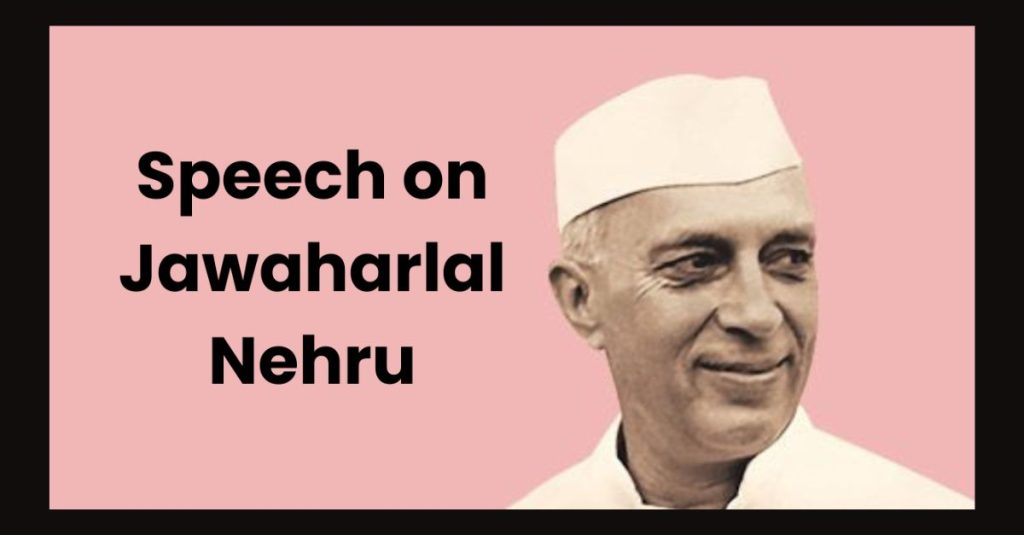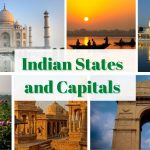Speech on Jawaharlal Nehru: Jawaharlal Nehru was India’s first Prime Minister. His dedication, diligence, and contributions to the struggle for freedom are still remembered. On many occasions, he can be discussed. While doing so, you can be asked to deliver a speech about him in English. Such speeches are in the informative category. Here in the ensuing article, we have provided a sample speech which you can refer to. Additionally, a famous saying by him has been listed below. Read thoroughly to extract information regarding Jawaharlal Nehru are subsequently prepare your Speech on Jawaharlal Nehru in English.

Speech on Jawaharlal Nehru in English
Usually, you can get the speech theme of the life of Jawaharlal Nehru on political events or general assignments. Here, you have the chance to prepare your speech on the course of his life and probably get into the details of his ideologies and political career. But, on the occasion of Children’s Day, you will have to deal with his love for children and the history behind the occasion. Jawaharlal Nehru also happens to be an inspirational man who never shied away from being fearless and honest with his approach. He can also be picked up for the topic of being an inspiring man.
While writing the Speech on Jawaharlal Nehru, recognise the purpose and selectively add points. Speaking about someone requires knowledge and preparation and one cannot simply go up and speak their heart out. Escape controversies and stick to facts and achievements. Acing this speech is easier than it seems. The speaker must aim to sound informative only.
Quotes by Jawaharlal Nehru
You can consider the following liners and quotes that were publically said by Pt. Jawaharlal Nehru and add them to your speech to make it more interesting and emphasising:
- The forces in a capitalist society, if left unchecked, tend to make the rich richer and the poor poorer.
- Time is not measured by the passing of years but by what one does, what one feels, and what one achieves.
- Do not advise too much: do the job yourself. This is the only advice you can give to others. Do it and others will follow.
- Loyal and efficient work for a great cause, even though it may not be immediately recognized, ultimately bears fruit.
- Ignorance is always afraid of change.
- Culture is the widening of the mind and of the spirit.
- Where freedom is menaced or justice threatened or where aggression takes place, we cannot be and shall not be neutral.
- A moment comes, which comes but rarely in history, when we step out from the old to the new, when an age ends, and when the soul of a nation, long suppressed, finds utterance.
- Failure comes only when we forget our ideals and objectives and principles.
- It is far better to know our own weaknesses and failures than to point out those of others.
- The future belongs to science and those who make friends with science.
- The art of a people is a true mirror of their minds.
- People avoid action. Often because they are afraid of the consequences, action means risk and danger. Danger seems terrible from a distance; it is not so bad if you have a close look at it.
- Action to be effective must be directed to clearly conceived ends.
- The policy of being too cautious is the greatest risk of all.
Sample Speech on Jawaharlal Nehru
“Success often comes to those who dare to act. It seldom goes to the timid who are ever afraid of the consequences.”, said Pandit Jawaharlal Nehru, once.
Good Morning/ Afternoon/ Evening to each and everyone present in this room. It gives me immense pleasure and I am supremely glad that today I stumbled upon this podium to discuss the incredible and exemplary life of Nehru. Some people manage to leave unending and lifelong impressions even after their demise. India’s history is adorned with many leaders. One of these was Pt, Jawaharlal Nehru.
He was the very first Prime Minister of India who led the newly decolonized country to kickstart an independent nation’s journey. He was fearless and his contributions to the freedom fight of the Indian Subcontinent speak volumes. More than a politician, he was a man of people. Most importantly, he was Chacha Nehru and beloved of Kids. His sensitivity and compassion are not unknown. There is so much more to him that can and cannot be expressed in a few words. Today, I will try to articulate some things about him that made him the inspiration that he presently is.
Born on 14 November 1889, Jawaharlal Nehru hailed from a family of Kashmiri Pandits. His father happened to be a wealthy barrister while his mother, too had an elite family background. One can consider that Nehru was a privileged boy as far as positioning in society and monetary acquisitions were to be considered. Education thrived in the home and he obtained the most. Due to perpetual guidance from the theosophist Annie Besant, he grew much inclined towards the subject. He was drawn towards the history of Buddhism and Hinduism in India and eventually, Nehru absorbed ardent nationalism in the very early stages of his youth.
Jawaharlal Nehru gained his further education degree in Natural Sciences from Trinity College, Cambridge. His ideologies were influenced by writers and literates such as George Bernard Shaw, Lowes Dickinson, HG Wells, and more those belonging to the society. His passion for their works proceeded in a manner that even when he moved to London to get his education finished at Inner Temple Inn, he continued reading them. When Nehru came back to India, he decided to let his father’s profession thrive as he embraced legal practice by enrolling himself in Allahabad High Court. But the insipidity of the profession detached him. His compassion for nationalism took over his adamant plans and he ended up joining Indian National Congress despite his doubts regarding the efficiency of the party.
The moment World War I broke out, Nehru was seen as a radical. He started participating in activism on several occasions and the post prominent of them was the Non-Co-operation Movement. He led the exodus throughout the United Province which became Uttar Pradesh when India was freed. He was arrested as well for anti-British actions. Post his release after a few months from the arrest, he continued further. Nehru aimed at internationalising the struggles for the Freedom of India and strive towards the same. His vision of the Indian National Congress’s policies was clear. He believed in Fundamental Rights and supported a stable Economic Policy.
It was Nehru and a few others who were involved in the political system who decided that India needs to cut its ties with the British Empire. They believed that India must cease to exist as a mere British Colony and that the people, their cultures, rights, freedom, and independence needed to be preserved. They demanded India to be a dominion. The demands were initially rejected but that did not stop Nehru and his allies. He hoisted the tricolour upon the banks of the Ravi in Lahore on 1 January 1929. In 1939, the Nationalist movement commenced during the outbreak of World War II where Nehru played a prominent role. He was arrested on several occasions in his life as he participated in India’s struggles against British dominance but since he happened to be a paramount influence, he always emerged as a hero. Finally, the British 1946 Cabinet Mission to India was introduced for the transfer of interim government and Congress won the most number of seats in the elections of the Constituent Assembly under the Presidency of Nehru.
When India was freed as an independent Nation, Jawaharlal Nehru was positioned as the First Prime Minister. He steered the nation through Independence, the immediate issues that followed, the Assassination of Mahatma Gandhi, the Integration of States, the Adoption of a fresh Constitution, and so much more. He served 18 years as the PM of the nation. He was known for his Modernisation Vision, mixed Economic Policies, Agricultural Policies focused on Agrarian Reform and Rapid Industrialisation, Social embellished with adamancy about Education, the introduction of Hindu Marriage Law, Reservation of the Oppressed, and a Hindi supportive Language Policy. His Foreign Policies made India continue as a Commonwealth nation and integrated it into the Non-Aligned Movement. He made sure that the sanctity of India was protected despite the constant outbreak of violence and terrorism in Kashmir. He made efforts to share an allied relationship with China, the USSR, and the United States.
Nehru received much criticism for his annexation of Goa from the Portuguese while engaging in the use of Military Power. Despite that, he managed to gain unmatchable support from the people. He outshined many leaders in politics and it was his diligence and faith in Indian Politics that formed a concrete foundation stone for the Indian National Congress that further survived under the name of Indira Gandhi, his only daughter.
There were nearly four assassination attempts were observed against Nehru who believed that his security could not come in the way of the normal life of Indian people. Later, succumbing to the ailments of Old Age, his health conditions gradually deteriorated. It was on 27 May 1964 that he finally lost his life to a cardiac arrest that was sudden. His legacy not only exists in the political world due to obvious reasons, but also in the world of literature through his books, The Discovery of India, Glimpses of World History, An Autobiography, and Letters from a Father to His Daughter. His public Speech, A Tryst With Destiny is pronounced to be one of the best speeches of the 20th Century.
Nehru’s Secular Policies are still a matter of debate in India and the history of relationships has been questioned multiple. There has been a fair amount of unavoidable criticism of his policies as a Prime Minister. Still, Nehru happens to be a very respected name in the History of India. His struggles and nationalism can never be doubted for a moment. India might not have seen a leader like him and it was his policies, ideologies, and efforts that formed the strong political base in India. He shall always be remembered when India’s Political History and Freedom journey is to be discussed.






